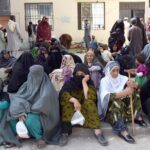Karachi – In a move that has drawn sharp international criticism and deepened fears of an intensifying humanitarian crisis, Israel’s security cabinet has unanimously approved a controversial military plan aimed at the “capture” and control of Gaza. The new strategy includes a full-scale expansion of Israel’s ground offensive, forced displacement of civilians, and an overhaul of humanitarian aid delivery – all of which have been condemned by aid agencies as violations of international humanitarian principles.
According to an Israeli official who briefed international media, the strategy, proposed by Israeli military Chief of Staff Lt Gen Eyal Zamir, aims to dismantle Hamas’ infrastructure, recover remaining Israeli hostages, and assert long-term military control over Gaza. Prime Minister Benjamin Netanyahu reportedly called it a “good plan,” claiming it would fulfill the war’s core objectives.
The official confirmed the plan entails “capturing the Strip, holding territory, moving the Gazan population south for their own protection, and launching intensified operations against Hamas.” Observers, however, warn that such a move risks further inflaming regional tensions and worsening the plight of Gaza’s already-devastated civilian population.
Mass Displacement and Control Over Aid
At the heart of the plan lies a troubling element: the forced relocation of Gaza’s 2.1 million residents further south, away from their homes, many of which have already been flattened by months of Israeli bombardment. Aid agencies fear this will amount to a new phase of ethnic cleansing disguised as “security measures.”
The United Nations and other humanitarian groups have strongly rejected Israel’s proposed aid distribution model, which seeks to sideline traditional channels in favor of private companies approved by the Israeli military. The Humanitarian Country Team (HCT), a consortium of UN agencies and international NGOs, warned that the move would allow Israel to weaponize essential supplies and further restrict access to the most vulnerable.
“It contravenes fundamental humanitarian principles and appears designed to reinforce control over life-sustaining items as a pressure tactic – as part of a military strategy,” the HCT said in a joint statement.
The shift in policy comes after Israel imposed a complete blockade on Gaza’s crossings in early March, halting all deliveries of food, medicine, and fuel. Now, after two months of starvation-level conditions, community kitchens in southern Gaza have warned they are only days away from running out of supplies.
Families of Hostages Break Silence
While Israel justifies its new offensive as necessary to free the remaining 59 hostages, no progress has been made in recent weeks. The Hostages and Missing Families Forum, which represents the relatives of those abducted on October 7, has accused the government of prioritizing land seizure over hostage recovery.
“This is an admission that the government is choosing territory over people,” the forum said, noting that over 70% of the Israeli public supports a deal for the hostages’ safe return rather than more military escalation.
Critics Warn of Long-Term Implications
Security cabinet member Zeev Elkin told Israeli media that there was “still a window of opportunity” for a hostage deal before former U.S. President Donald Trump’s scheduled Middle East visit from May 13-16. However, that optimism stands in contrast to ground realities: tens of thousands of Israeli reservists are being called up, new buffer zones are being drawn, and the offensive is poised to engulf more civilian areas.
Lt Gen Zamir stated that “operations will be expanded into new areas,” and vowed to destroy “all terrorist infrastructure above and below ground.” Yet critics question whether this will bring any strategic gains – or simply deepen the suffering.
A Growing Humanitarian Disaster
According to Gaza’s Hamas-run health ministry, more than 52,567 Palestinians – mostly women and children – have been killed since the start of the Israeli offensive on October 7, 2023. Since Israel resumed operations six weeks ago, another 2,459 have died.
The UN says Gaza’s population is facing famine-like conditions. With warehouses emptied, bakeries shuttered, and aid routes cut off, the risk of mass starvation grows by the day.
Despite its obligations under international law, Israel maintains it is complying with humanitarian norms – a claim the international community increasingly disputes.
Pakistan’s Stance and Global Solidarity
While Pakistan has long supported the Palestinian right to self-determination, the recent developments have reignited calls from civil society and political circles for stronger action. Pro-Palestinian protests are being planned across major Pakistani cities, echoing a growing sentiment that the world must act to stop what many are calling a slow-motion genocide.
As the conflict escalates and humanitarian conditions deteriorate, the question remains: How many more lives must be lost before the world takes decisive, meaningful action?














